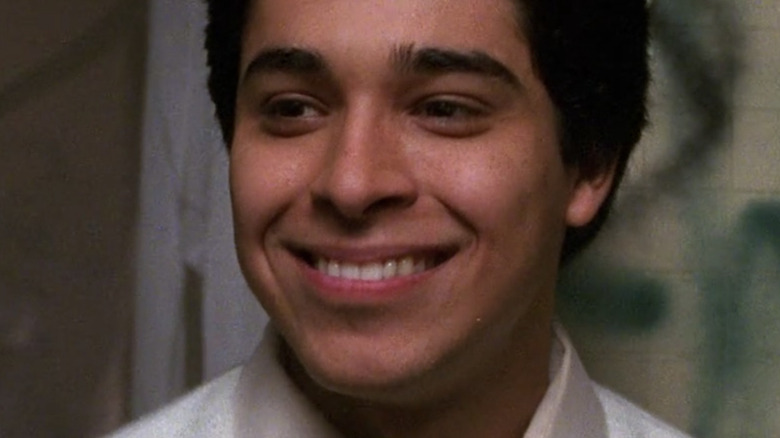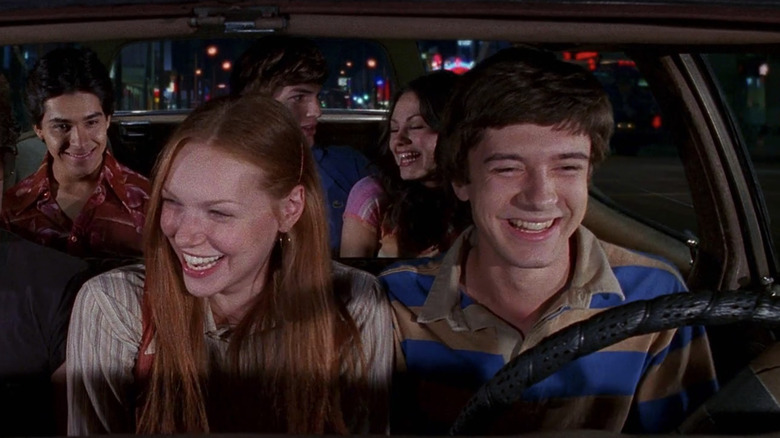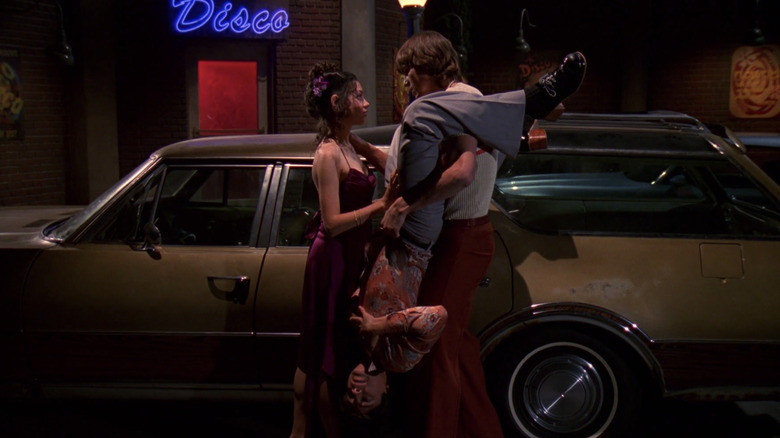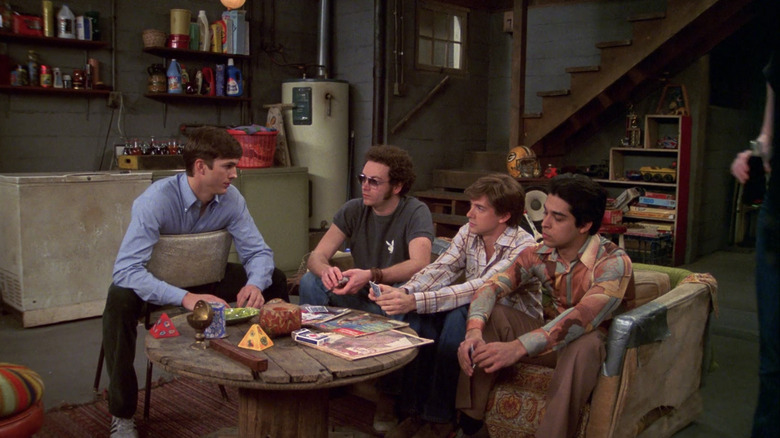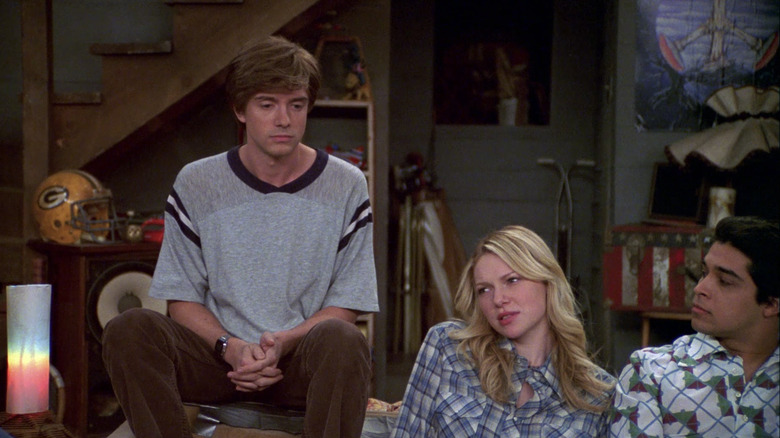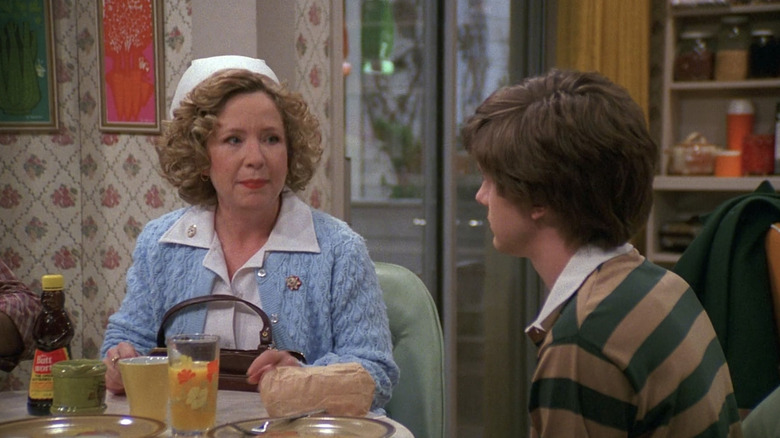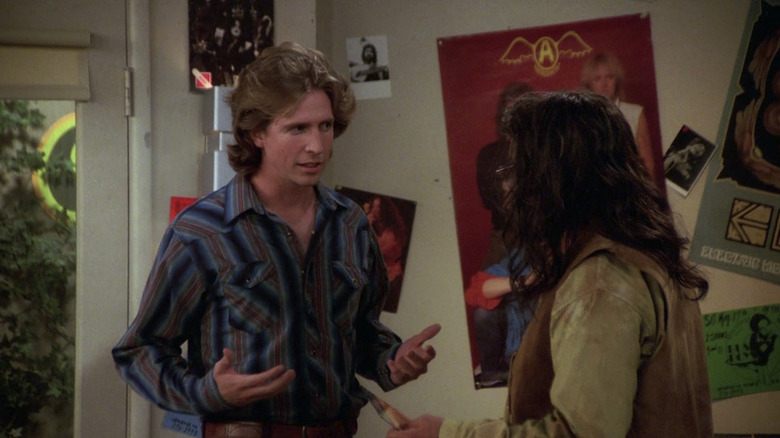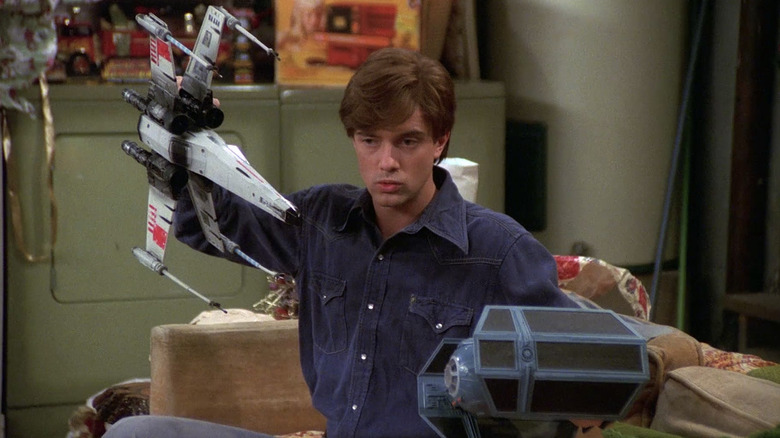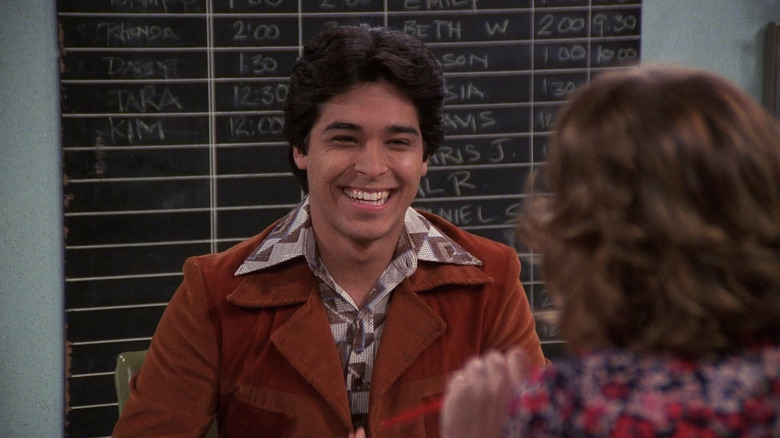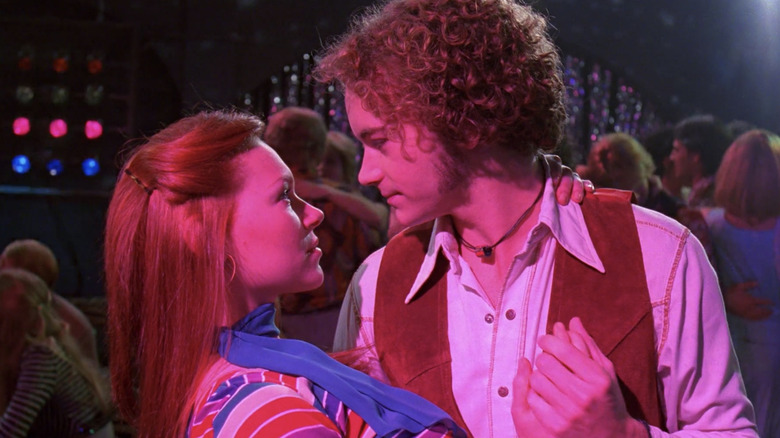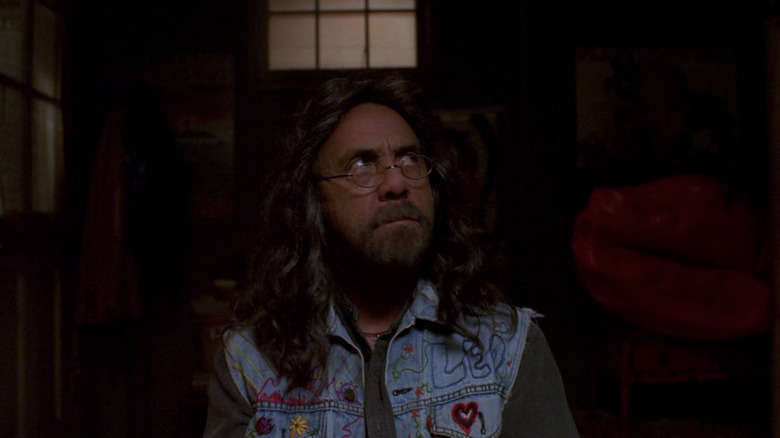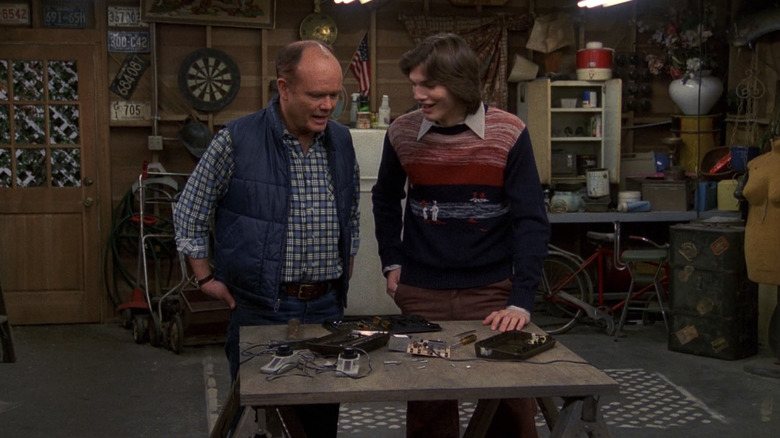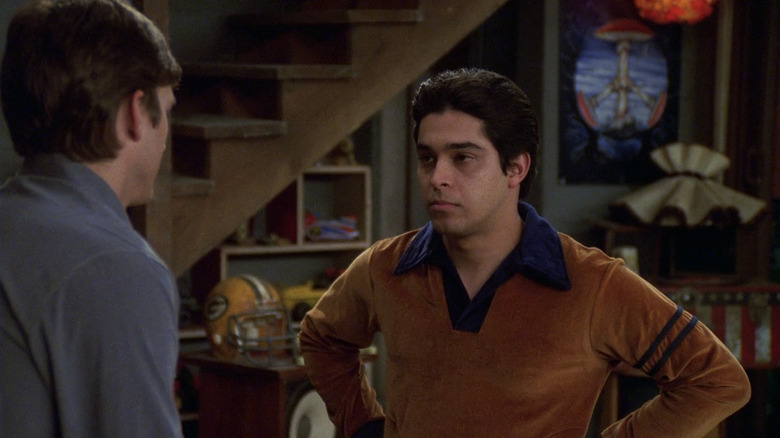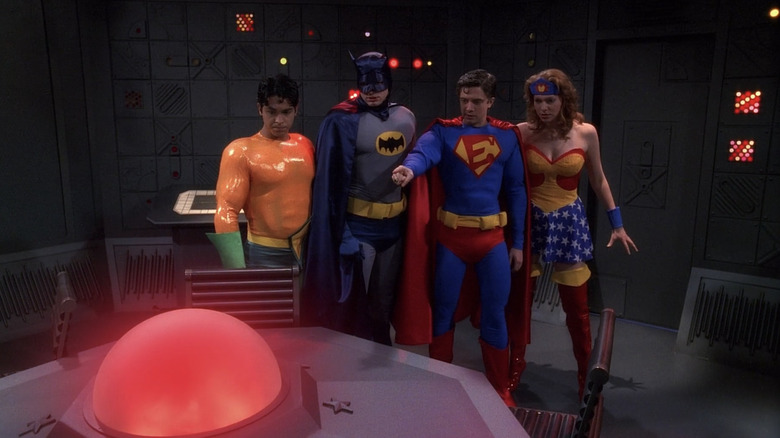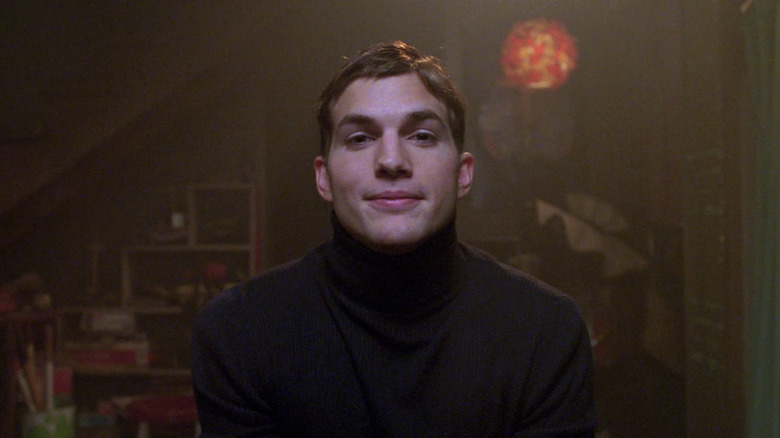That '70s Show: The 7 Best And 7 Worst Things About The Sitcom
It's no secret that the beloved sitcom "That '70s Show" was by far one of the most iconic and popular sitcoms of its era, achieving immense popularity with audiences young and old following its premiere in 1998. Throughout its eight seasons on the air, the series endeared itself to millions of fans across America with its hilarious snapshot of teenage life in the 1970s, as friends Eric Forman (Topher Grace), Donna Pinciotti (Laura Prepon), Jackie Burkhart (Mila Kunis), Steven Hyde (Danny Masterson), Michael Kelso (Ashton Kutcher) and Fez (Wilmer Valderrama) weather the trials and tribulations of growing up in Point Place, Wisconsin.
Even long after its initial run on television, the show remains extremely popular, with many fans praising the way the series makes them feel nostalgic through its accurate portrayal of teenage life and its status as a comfort show. Although the extreme popularity of the series makes it clear that there is plenty to love about "That '70s Show," that doesn't mean that the show doesn't have its fair share of pretty serious flaws — some of which are so egregious they can make certain episodes almost unwatchable. Here are the seven best things and the seven worst things about the mixed bag that is "That '70s Show."
Best: The iconic theme song
Considering the fact that the series has staked its reputation on evoking nostalgia, it should come as no surprise that one of the best things about the series is its '70s-inspired theme song. The song itself is "In the Street" by the band Big Star, which was initially released in 1972 and was re-recorded by Todd Griffin for Season 1 of "That 70's Show," though from Season 2 and beyond the song was performed by the iconic '70s rock band Cheap Trick.
This memorable tune — which begins with the line "Hangin' out down the street, the same old thing we did last week" — is all about the simple pleasure of spending time with your friends, whether that means partying, listening to music, or doing nothing at all. The song is accompanied by a montage of various characters from the series singing along inside the Forman family's 1969 Oldsmobile Vista Cruiser.
The extended lyrics to the song further emphasize its connection to life in the 1970s, particularly through lines like "Nixon's gone but rock lives on" (via Genius). This incredibly catchy theme not only helps evoke the nostalgia factor of "That 70s Show," but also gives an accurate description of what we can expect from each and every episode — teenage friends just hanging out.
Worst: Jackie's many failed relationships
Longtime fans of "That '70s Show" will know that some of the most overused storylines within the series are Jackie's numerous on-again-off-again relationships. At the beginning of the series, she is dating the dim but lovable Kelso in a relationship that would eventually extend beyond the screen and lead to Mila Kunis and Ashton Kutcher getting married in real life. Throughout the first four seasons, those two would have a disastrous relationship in which they both cheat on each other several times.
Following a Season 4 finale in which Jackie and Kelso break yet again, Jackie begins dating Hyde, who started the series despising her. The show repeats itself once again by having Hyde cheat on Jackie in Season 5 to end their relationship, then having them reunite a season later. In the end, their relationship fizzles out around Season 8, at which point they return to hating one another — making their entire failed romance completely pointless.
On top of that, in the end, she decides that Fez was the one she wanted to be with all along, making her prior relationships a waste of time and energy for all parties involved. Jackie's failure to maintain a relationship is one of the most frustrating and unnecessary sources of conflict in the entire series. Perhaps, for the long haul, it would have been better for her character to just stay with either Kelso or Hyde.
Best: The chemistry between the main cast
Outside of the aforementioned romantic struggles between Jackie Burke and her numerous boyfriends, it's safe to say that one of the most endearing aspects of "The '70s Show" is the chemistry between its main cast. Whenever the six teenage protagonists are on screen together, there's never a moment where you doubt that they're actually best friends. Beyond that, the dynamic between their conflicting personalities makes them a joy to watch in each and every season.
Indeed, there are countless laugh-out-loud moments that result from some disagreement between the goofy, dim-witted Kelso and the tough, sarcastic Hyde. There are also constant misunderstandings between the painfully-awkward Eric and his stubborn girlfriend, Donna. The chemistry between the main characters is so great that some of the most entertaining scenes in the series simply involve them sitting around and talking in the circle.
In any case, there's no doubt that the main cast of characters complement each other perfectly. Even if they may not have all gotten along behind the scenes of "That 70's Show," their chemistry on-screen is undeniable.
Worst: Eric's personal storyline ends abruptly
There's no doubt that one of the most shocking moments in "That '70s Show" is the abrupt departure of series lead Eric — whose storyline comes to a sudden end during Season 7. In the finale of Season 7, Eric departs for Africa to become a teacher, abandoning his friends and his relationship with Donna for an uncertain future.
The move itself makes very little narrative sense, as the build-up to Eric's sudden move takes place over about five total episodes, in which he decides to become a teacher seemingly out of the blue after an offhand suggestion from Hyde. On top of that, his departure makes his long-term relationship with Donna seem pointless, especially when you consider the fact that he proposed to Donna the season prior.
Although the abrupt end of Eric's personal storyline made very little sense, there was actually a pretty significant reason for why he was phased out of the show so quickly — actor Topher Grace left "That '70s Show" to pursue new opportunities in Hollywood. As such, it's no wonder that Eric's storyline ended in such an abrupt and unsatisfying manner.
Best: Interesting parental figures
Despite the fact that much more of the series is devoted to the exploits of its eccentric teenage cast, it's fair to say that there are times when the parents within the series become much more interesting than their children. In particular, Red and Kitty Forman (played by Kurtwood Smith and Debra Jo Rupp, respectively) are two of the most well-developed characters in the series -– on top of being two of the funniest characters on the show.
Red's character arc sees him slowly letting down his guard and transforming from a grumpy and sarcastic veteran into someone who can fully express the love he feels for his family. Kitty's story sees her grappling with alcohol and tobacco dependence despite her jubilant outward appearance. On top of these surprisingly deep storylines, they are also two of the most popular characters in the entire series. In fact, they remain so popular that they return to "That '90s Show," which will see the pair looking after their granddaughter Leia Forman (Callie Haverda).
Where some teenage sitcoms tend to neglect the parental figures within the series, "That '70s Show" does an excellent job at making the parents feel just as important and interesting as their children.
Worst: Trying to replace Eric with Randy
As if the abrupt and confusing departure of Eric Forman wasn't already bad enough, the show clumsily attempted to replace him with Randy Pearson (Josh Meyers) during its eighth and final season. Randy is introduced at the start of Season 8 as a new hire at the record store run by Hyde, and it is soon made clear that he is an obvious replacement for Eric, as he becomes a romantic interest to Donna as well as the de-facto leader of the group's various plans and schemes.
This attempt to replace Eric is still ridiculed by fans to this day, with many fans on Reddit asserting that Randy's introduction feels incredibly forced and out of place. As pointed out by u/KreegsMcSteves, the introduction of Randy is further complicated by the fact that his character served as a replacement for both Eric and Michael Kelso — combining a few qualities from both characters but retaining none of their charms.
Considering the immense backlash that Randy received from fans, it should come as no surprise that he was essentially phased out of the final episode, "That '70s Finale." Randy has only a single line before being replaced himself by a returning Eric Forman. Though Randy Pearson only lasted a single season, this awkward attempt to replace Eric remains a sore spot for many fans of the series.
Best: Funny running gags
As in all great sitcoms, one of the most memorable and beloved parts of "That '70s Show" is the series' hilarious running gags. A few of the series' most notable recurring jokes include Eric's reverential obsession with "Star Wars," Hyde's numerous conspiracy theories (which only grow more outlandish with each season), and the deliberate ambiguity about where Fez is actually from.
Perhaps even funnier than these recurring gags are the numerous one-liners and catchphrases that the characters repeat throughout the series. These include Michael Kelso's cries of "Ow, my eye!" whenever he got into a fight with Hyde, Fez's "I said good day!" whenever he becomes angry and storms off, and Red's constant and iconic insults towards Eric — most of which are some combination of "Dumbass!" and "I'm gonna put my foot in your ass!"
These recurring gags age like a fine wine as the series goes on, and it's safe to say that they remain one of the most memorable and hilarious aspects of the series even now.
Worst: Making fun of Fez's ethnic background
Although it's sometimes quite funny that nobody knows exactly where Fez is from, there are certainly plenty of moments where the characters (and the series itself) take extensive liberties mocking his ethnic background. Sadly, this occasionally reaches a point where he is sometimes diminished to nothing more than a walking punchline.
Fez's character leans into a variety of racist stereotypes throughout his time in the series and is sometimes portrayed as a loud, ignorant immigrant with a variety of unusual customs and beliefs. Red, in particular, is fond of giving him a plethora of foreign-sounding nicknames and seems to hold some kind of hatred toward the teenager simply because he isn't from America.
Perhaps the worst treatment Fez receives within the series is the innocuous-sounding nickname he was given by his so-called "friends." Since none of his friends bothered to learn how to pronounce his real name, he goes simply by F.E.S. -– which stands for Foreign Exchange Student. In any case, the constant jokes about Fez's ethnic background are one aspect of "That '70s Show" which has aged extremely poorly.
Best: '70s nostalgia
As previously mentioned, one of the most endearing aspects of "That '70s Show" is the way in which the series evokes nostalgia for its titular time period — something which appeals to both people born after the '70s and people who experienced their teenage years during that particular era.
"That '70s Show" focuses heavily on several prominent aspects of 1970s America. These include the rising anti-establishment mentality across America (embodied primarily by Steven Hyde), the surge of marijuana use in the country (seen whenever the audience visits the circle), and a rising sense of teenage independence.
On top of that, the series is chock full of references to the popular culture of the 1970s, with Eric's bedroom acting as almost a shrine of vintage '70s posters and sci-fi memorabilia — much of which is dedicated to "Star Wars." As such, the series as a whole serves as a love letter to an age gone by, and the sense of nostalgia it embodies is one of the show's best qualities.
Worst: Major characters that popped in and out without explanation
There's no question that the Season 7 departure of Eric and Kelso from "That '70s Show" met immense backlash from fans, though it's worth pointing out that the series has a long history of major characters popping in and out without any explanation. A few notable examples include Donna's two sisters (who abruptly disappear from the series after Season 1), Midge (Tanya Roberts, who left the series in Season 3 and returned in Seasons 6 and 7), and Steven Hyde's boss Leo Chingkwake. Of course, there was a reason Leo vanished without a trace during Season 5 and Season 6 — it was due to the real-life arrest and imprisonment of Tommy Chong.
On top of that, both Kelso and Eric return as guest stars in Season 8, making their prior absence seem both unnecessary and confusing. Although in some cases these unexplained absences were unprecedented and out of the show's control, the show has an unfortunate history of characters disappearing for long stretches of time and then abruptly returning as though nothing had happened. It's enough to make any fan scratch their head, and the lack of consistency in the series' main cast leads to some incredibly awkward and confusing disappearing acts throughout "That '70s Show."
Best: Red being a strict but well-meaning parent to all of his son's friends
Although Red's harassment of Fez is one of his worst qualities, one redeeming factor of his character is that he acts as a father figure to nearly every one of his son's friends — exhibiting the same strict but well-meaning attitude he displays towards Eric.
Throughout the series, we see Red display his signature tough love towards all of the members of Eric's friend group. Despite his annoyance at their supposedly delinquent behaviors, he encourages them to become the best versions of themselves. The disgruntled veteran takes a particular liking towards Hyde in spite of the latter's overt disdain for the American government, often praising and supporting Hyde more than his own son. Eventually, Red and Kitty allow Hyde to move into their home after he is abandoned by his mother, essentially making them his foster parents.
Although he may have a reputation as one of the grumpiest father figures in all of television, Red Forman's parental guidance towards Eric's friends still makes him an extremely complex and likable character.
Worst: Several questionable actions of a sexual nature
By now, it has become clear that fans endured plenty of questionable things in "That '70s Show." Still, perhaps the most objectionable aspect of the series is the constant sexism and sexual harassment displayed by Fez.
On top of the fact that he embodies a host of racist stereotypes, Fez is constantly seen making dirty jokes and extremely inappropriate advances on women -– including the girlfriends of his close friends. Perhaps the most horrifying instance of this occurs in the Season 7 episode "2000 Light Years from Home," in which Kelso attempts to break up with his girlfriend Angie (Megalyn Echikunwoke). In what is perhaps the most unsettling moment in the entire series, Fez suggests that Kelso turns the lights off while he and Angie are having sex –- at which point Fez would enter the room and sexually assault Angie.
This incredibly disturbing suggestion is played off as a joke and nicknamed "the dark room switch" and is a prime example of the problematic sexual behavior inherent to Fez's character, undeniably one of the worst parts of the series.
Best: Often parodying famous films and shows
On top of the numerous references to 1970s pop culture scattered throughout "That '70s Show," the series is also infamous for parodying a variety of prolific films and television shows. More often than not, these parodies appear in the form of dreams and daydreams by one of the six main cast members, satirizing their problems in the guise of famous works of fiction.
This includes a parody of "Beauty and the Beast" in which Jackie and Fez play the titular roles, a fully choreographed parody of "Grease" set to "You're The One That I Want," and a dream in which Michael Kelso enters the stop motion animated world of "Rudolph the Red-Nosed Reindeer."
In addition, the series went full "Treehouse of Horror" in its Season 3 episode "Too Old to Trick or Treat, Too Young to Die." That episode includes parodies of five different Alfred Hitchcock films, including "Vertigo," "The Birds," and "Psycho."
These lovingly-crafted parodies are some of the most entertaining scenes in the entire series and do an excellent job of keeping the story fresh and exciting.
Worst: A clumsily handled series finale
The series finale of "That '70s Show," aptly titled "That '70s Finale," is an episode that focuses primarily on the Forman family's New Year's Eve party to ring out the '70s and welcome 1980. Although there are plenty of heartwarming moments throughout this finale (with many fans saying they were brought to tears by the episode), the ending also clumsily wraps up several major storylines, which left plenty of fans feeling dissatisfied. Specifically, the episode brings Eric and Donna back together out of the blue while Jackie inexplicably begins a relationship with Fez — whom she had spent the past eight seasons constantly rejecting.
On top of these sudden shifts in the story, many fans on Reddit also claim that the series had worn out its welcome long before this finale, and as such, it was simply a bad episode all around. "The finale kinda sucked, but honestly my expectations werent high as I didn't care for much of the last 2 seasons," explained u/no_one_knows42. "Characters became more 1 dimensional, eric was gone (and his replacements sucked) and the jokes got stale."
Although there are certainly plenty of emotionally poignant moments scattered throughout "That '70s Finale," the episode itself clumsily wrapped up most of its significant storylines in a rushed and unsatisfying manner, and most of the problems from throughout Season 8 remained in the finale as well.
